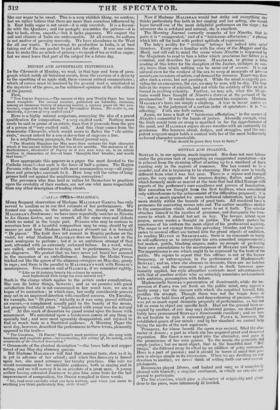diVRA—MALIBRAN.
MORE frequent observation of Madame MALIBRAN GARCIA has only served to confirm us in our first estimate of her performances. We formed our opinion, in the notice alluded to, mainly on Madame MALIBRAN'S Desdemona ; we have since repeatedly seen her as Ninetta in La Gazza Ladra, and we remark all the same vices and defects which we noted in the tragic part. Persons who may be curious to ascertain how ill a beautiful composition may be sung, should by all means go and hear Madame MALIBRAN decorate (as it is termed) " Di placer." The fault does not consist in flinging perfume on the violet, for what Madame MALIBRAN does on ROSSINI is not in the least analogous to perfume ; but it is an ambitious attempt of that sort, attended with an extremely awkward failure. In a word, what are called, with reference to design, not to performance, her graces, are disgraces. We protest that we have never yet heard her succeed in the execution of an embellishment. Imagine the Medici Venus tricked out like the queen of the chimney-sweepers on May-day, gaudy in rags ; and there is the parallel to MALIBRAN'S work with ROSSINI s masterpieces. GOLDSMITH said of GARRICK, if we remember rightly,
" Like an ill judgingbeauty his colours he spread, And beplastered with rouge his own natural red."
Such is the charge which applies to the artiste under consideration. She can do better things, however; and as we perceive with great satisfaction that she is not encouraged in her worst taste, we are in hopes of its correction ; in which case, her really considerable powers may act in an improved direction with excellent success. On Tuesday, for example, her " Di piacer," wickedly as it was sung, passed without an encore,—a compliment usually paid to the beauty of the music, but properly withheld when " beplastered with rouge was the natural red." At this mark of discretion we gazed round upon the house with amazement. We calculated upon a boisterous encore of any thing so specially bad ; and were most agreeably disappointed, and rejoiced to find so much taste in a theatrical audience. A Morning Paper the next day, however, described the performance in these terms, pleasantly opposed to the truth-.- "The Cavatina, Di Placer,' Rossini's most precious gem, she sung with touching and exquisite grace—not overloading, but setting off, the melody, with ornaments of the chastest description."
" Ornaments of the chastest description "—the brass ladle and copper ' tinsel of our May-day chimney queens. But Madame MALIBRAN Will find that musical taste, slow as it is, is yet in advance of her school ; and when this discovery is forced upon her, she must renounce her tawdry practices. Om rule we would recommend for her infallible guidance, both in singing and in acting, and we will convey it in an anecdote of a great man. A young author having entreated JOHNSON to give him some hints for the last improvement of composition, the Doctor complied in these words, " Sir, read over carefully what you have written, and when you come to anything you think particularly fine, strike it out." Now if Madame MALIBRAN would but strike out everything' she. thinks particularly fine both in her singing and her acting, she would leave herself one of the most delightful performers on the stage ; ear wherever she is subdued and natural, she is excellent.
The Morning Journal correctly remarks of her Ninetta, that in parts it is " exaggerated," and of a `boisterous affectation ;" a phrase which hits off the fault with perfect aptitude of expression. The lady's avidity for " striking" betrays her indeed into outre blunders. Every one is familiar with the story of the Magpie and the Maid, and NVill call to mind the scene where .Ninetta is requested by the Magistrate to read to him a letter which proclaims her father as a criminal, and describes his person. MALIBRAN, in giving a false reading of this letter for the deception of the Justice, indulges in sun- dry tears, than which nothing can be more out of season, It is not natural even for the weakest of the sex to weep at moments of intenee anxiety,on occasions of action, and demand for resource. Tears may flow after such a crisis, but not pending it. While the mind is eagerly pro- viding for an emergency, the eye, we may he sure, will he dry. The tear falls in the repose of anguish, and not while the subtlety of the mind is busied in averting calamity. Further, we may ask, what the Mzeris- trate would have thought of Ninetta's distress at the perusal of proclamation? It would have surely alarmed his suspicion. , Maclaine:. MALIBRAN'S tears are simply a claptrap. A tear is never amiss on the stage, in the judgment of a certain order of spectators : it is " so. affecting." Voila unehelle raison. Again, we have a fault of " boisterous affectation," in the scenes of iVinetta's committal to the hands of justice. Absurdly enough, what the Irish would term an army is marched in for the apprehension of the maid, and MALIBRAN enjoys divers wrestles with an eminently fat gendarme. She bounces about, dodges, and struggles, and the cor- pulent sergeant-major holds a contest with her of the most ludicrously awkward character conceivable.
" What should be grave they turn to farce."


















 Previous page
Previous page